CLAS 355
Apuleius, The Golden Ass
April 17, 2024

Apuleius, The Golden Ass
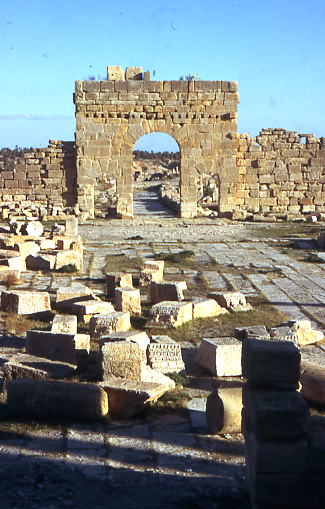
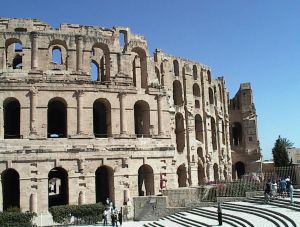
L: Ancient ruins at Madaura, Algeria; R; Roman amphiteater (El Djem, Tunisia)
Apuleius: born ca. 125 CE (Antoninus Pius, 138-161 CE; Marcus Aurelius, 161-180 CE) at Madaura, North Africa (= Mdaurusch, Algeria); longtime Roman province; cultural crossroads & multilingual (Punic, Latin, Greek)
- Apuleius' father a magistrate; studies at Carthage, Athens, Rome (philosophy, rhetoric, science & natural history, mythology), belongs to classicizing & antiquarian Second Sophistic movement
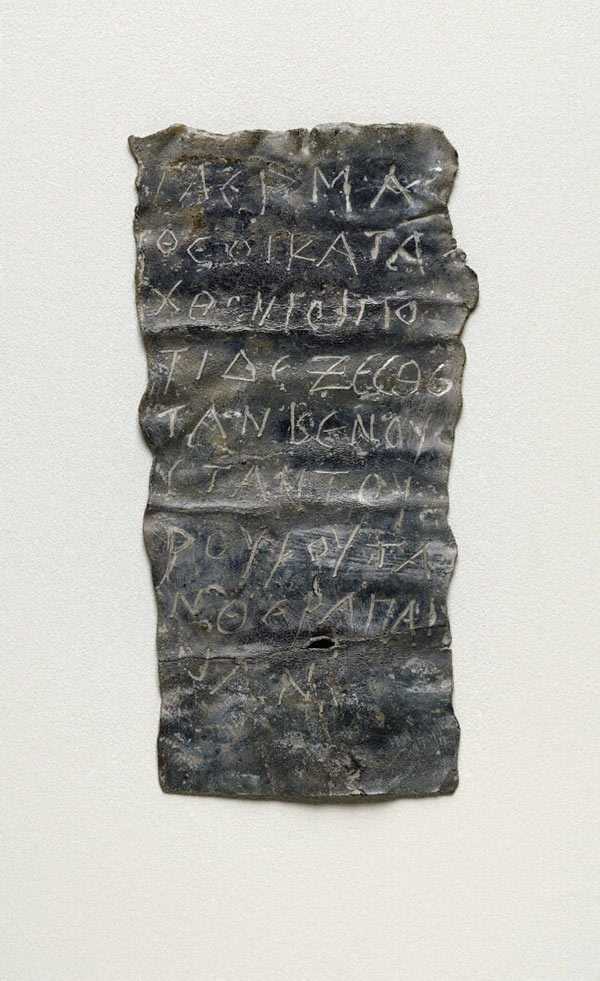
Curse tablet (Morgantina, Sicily, ca. 100 BCE)
- charge of magic by wealthy wife’s family (158 CE): Apology ("Defense"), display of learning & philosophy, detailed knowledge of magic (black & theurgic/"divine magic"); modern readers' suspension of disbelief ?
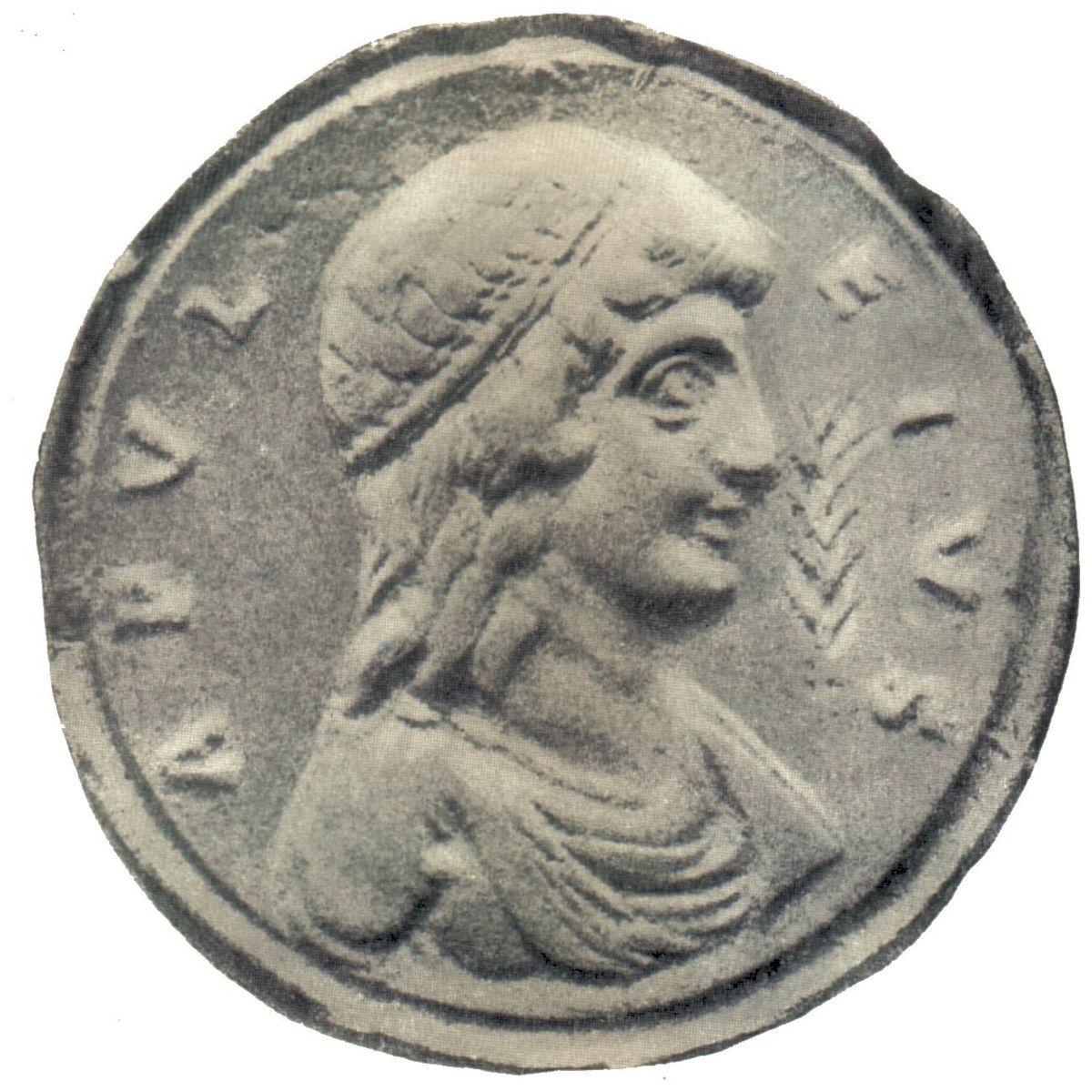
Apuleius Medallion, 4th century CE
- traces & teases of autobiography in The Golden Ass: Diophanes the (fraudulent) soothsayer to Lucius, “. . . my fame would blossom nicely, and my life would turn into an incredible, mythical, multivolume work” (2.12)
- The Golden Ass or Metamorphoses ("Transformations", after Ovid; ca. 160s CE): only complete Roman novel (prose fiction/Greek novel = separation of lovers & Odyssean journey home; cf. casual allusions to Homer's Odyssey (1.12, 2.14)
- The Golden Ass: spiritual journey & religious conversion ("I was going to Thessaly on business", 1.2) – Lucius' freedom in final book?
main themes:
slavery & freedom
beasts & humans (human/non-human animals)
appearances & realities
surface meanings &
underlying mysterie (symbols)
shifts of fortune vs stability (stable, personal identity in unstable world)
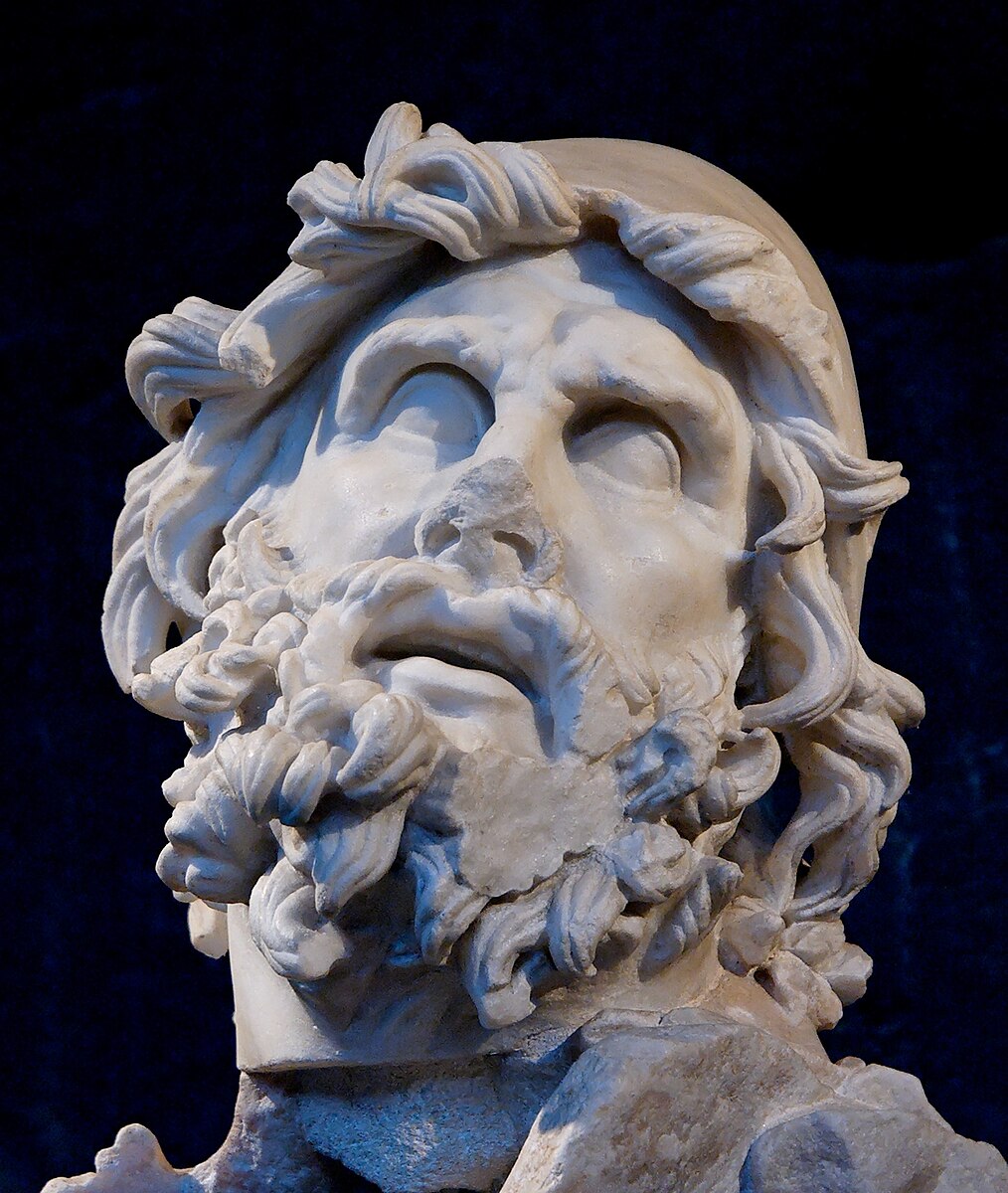
- The Golden Ass: draws from Milesian tales (Greek "pulp fiction"): short & episodic, sensationalist, exotic, erotic prose tales set in Miletus, Asia Minor, – entertainment without moral, philosophical, spiritual elements; genre transformed by Apuleius > Milesian & Egyptian story told by Greek narrator/character in "imperfect" Latin, "I'll make you wonder at human forms and fortunes transfigured, torn apart but then mended back into their original state . . . The story we are starting has a Greek original, you see. Give heed, reader: there is delight to be had" (1.1)
- narrator’s/Lucius’ essential characteristic: curiositas (magic & mystical secrets, illusion & reality), "It's not that I'm excessively inquisitive—I just want to know everything, or at least as much as I can" (1.2), "I was, in my high-strung way, ordinarily overly curious about everything rare and mysterious" (2.1)
- Lucius' status? education? (cf. friend & aedile Pythias in market at Hypata, "You put these mighty prices on your pitiful piscine wares", 1.25); appearance ("Aunt" Byrrhena, "He's tall but not too tall, slender but still juicy, and just rosy enough . . . His whole face is just a flower. He walks nicely but doesn't mince", 2.2)
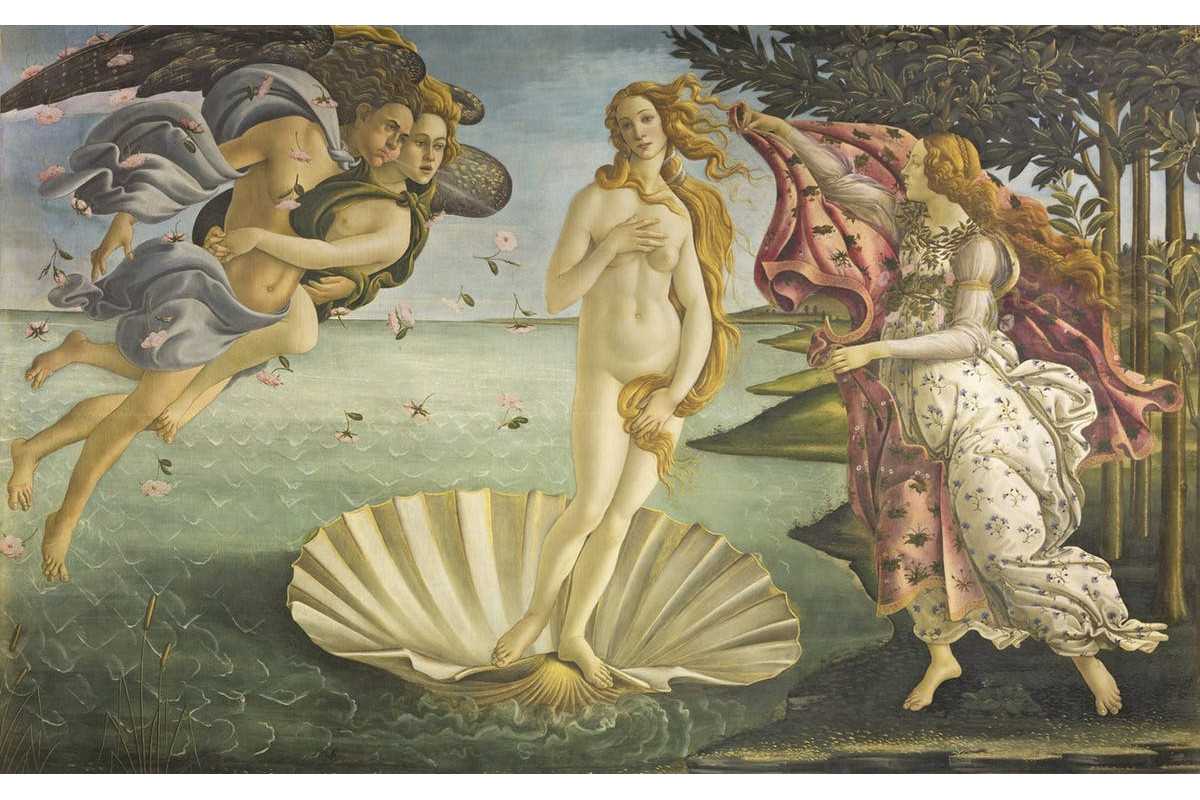
Botticelli, The Birth of Venus (ca. 1485)
- Lucius' hyper-educated/intellectualized/-izing experience of the world: aestheticizing, mystical search for hidden/symbolic meanings (cf. Platonism), e.g. exegesis on women's hair (2.8-9)
The Golden Ass 2.15-17 (first banquet with Photis, "Light")
It was all
like a picnic lunch before Venus' gladiatorial games . . . When I felt belligerent Cupid's arrow gliding in my heart, I stoutly drew my own bow, and I'm truly afraid my equipment's stretched so tight it'll snap in two . . . She was transformed into the ravishing image of Venus from the maritime waves, and for a few seconds she even put a pink palm in front of her hairless little lady parts.
The Golden Ass 2.12 (Lucius on the lamp Pamphile uses to predict weather)
Even though this very limited little flame's been formed by human hands, it carries
a memory of that huge, celestial fire, its quasi-parent, and can supernaturally prognosticate and inform us what the other's about to do clear up at the sky's summit.
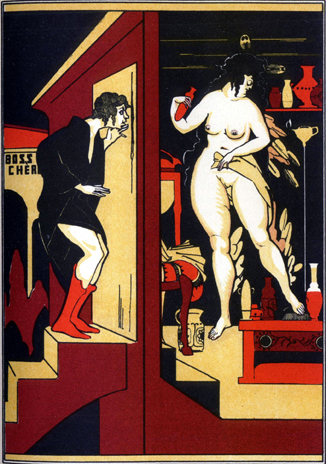
Lucius spies on Pamphile (illustration by Bosschère, 1947)
- Lucius' love of stories & storytelling, esp. blurring fiction/illusion/reality/supernatural:
his own tale of magician/sword-swallower & tiny dancer in Athens (1.4)
traveler Aristomenes’s tale of friend Socrates' "pesilent enslavement" to Meroe (1.5-19); reaction, "'I don't hold anything impossible,' I said" (1.20); cf. theme of women as witches/seductresses
Thelyphron’s story at Byrrhena's dinner-party (a Milesian tale: corpse-watch, funeral & necromancy, Thelyphron's discovery, 2.20-30)
- setting in Thessaly (witches & suspension of nature's laws)
The Golden Ass 2.1 (Lucius in magical Thessaly)
There wasn't a thing I saw in that town whose identity I trusted: it must all be transmogrified, no exceptions, through some spectral hocus-pocus. I thought the stones I tripped over were petrified persons; that the birds I heard came from the same stock but now had wings; no less the trees skirting the city walls, before they found themselves covered in foliage; and that the streaming fountains were human bodies liquefied. The statues and murals were going to stride toward me, the walls speak, the oxen and suchlike pronounce oracles, and divine utterance come straight from heaven and that rounded radiance that crosses it.
.jpg)
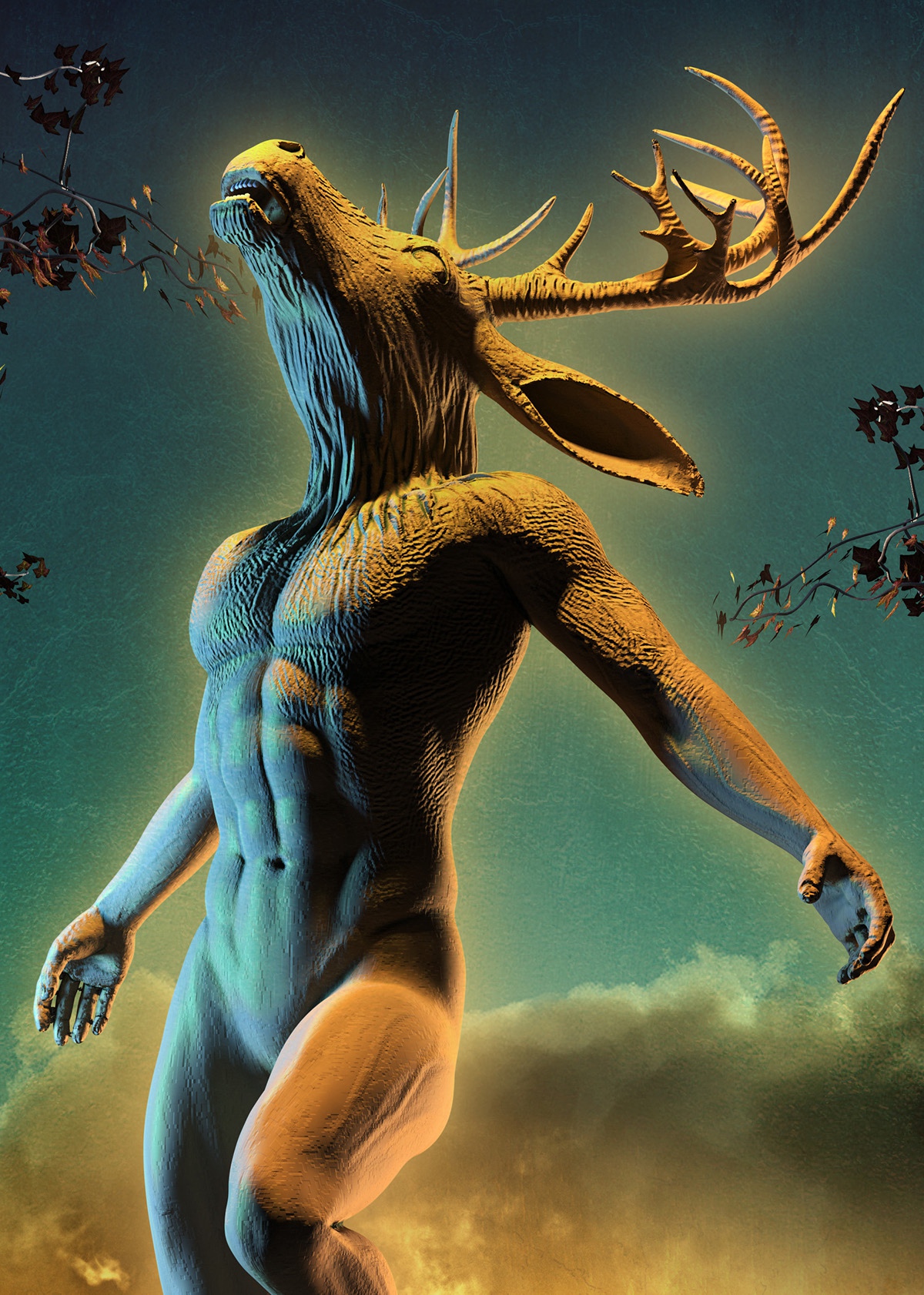
L: death of Actaeon (Apulian red-figure skyphos, 400-350 BCE)
The Golden Ass 2.4 (viewing statues in Byrrhena's atrium in Hypata)
In the middle of the marble foliage was Actaeon, craning forward and gawking at the deity. He was visible both in stone and on the spring's surface while, waiting for Diana to begin her bath in those very waters, he started to become less a human and more a stag.
- Byrrhena’s ironic words, “Consider everything you see your own” (2.5); her warning about Pamphile (Milo's wife)?; Lucius' reaction, "Well, I was a curious person. The moment I heard the word witchcraft, representing lifelong aspiration, I shrugged off any need to play it safe with Pamphile; far from that, I was ready to sign up as her apprentice and pay through the nose for it, to go right ahead and take that flying leap into the abyss" (2.6)
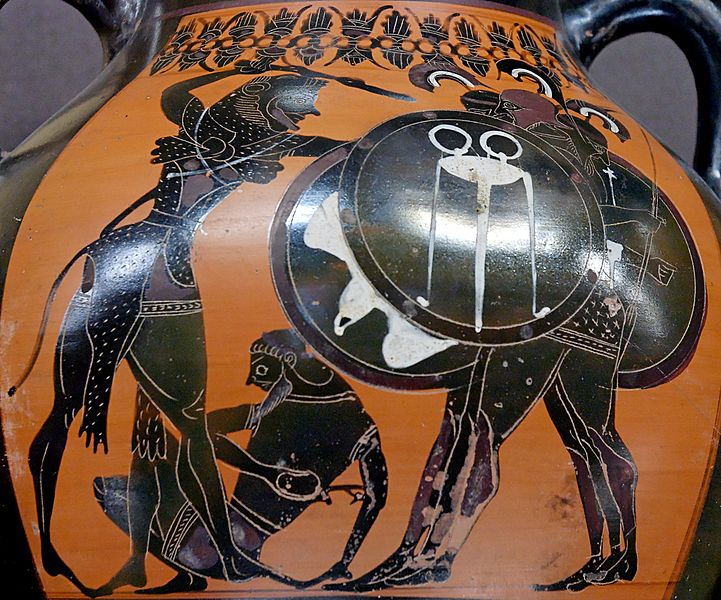
Herakles battles Geryon, Attic black-figure vase, ca. 540 BCE
- relationship with Photis: surrogacy for one with Pampile ("you should put some real effort into bedding his slave, Photis", 2.6)
- Byrrhena’s dinner party followed by killing of robbers at Milo's house ("tantamount to the massacre of Geryon", 2.32) on night before the Festival of Laughter
- idea of Lucius as a slave? to what?









.jpg)

